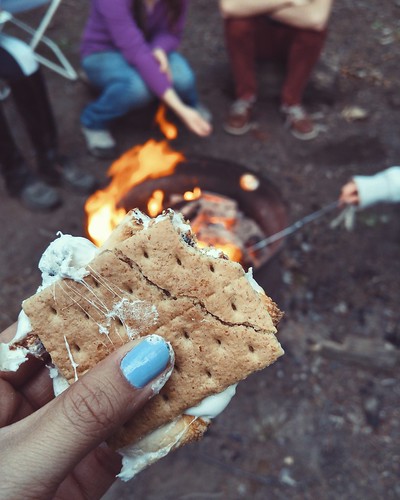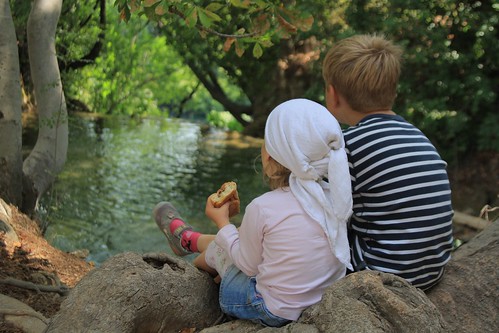In my youth, I spent some of my best summers at a rustic sleepaway camp on the edge of the Long Island Sound. Decades later, I can still tell you what those leaves smell like on a rainy day, what the beach rocks feel like on the souls of my feet, what color my tongue turned after drinking the colorful ‘bug juice’, and the taste of the crumb cake baked with love by Maryanne the cook. When crumb cake shows up on any menu, I smile—and no matter where I am in the world, one taste flings me right back to camp and the extra bites that Maryanne would leave out on the counter for all to enjoy.
I’m sure I knew what savoring was prior to seeing it pop up on a word list while studying for the SATs. I’m certain I’d heard about ‘savoring the moment’ or read a critic’s review of savoring some famed dish at a restaurant. But it wasn’t until these last few years that I truly began to understand its implication, sentiment, and power.
There are many things we encounter that change our lives, expand our worlds, and enhance our existence. Savoring is one of them.

“Don’t slide through life. Savor it. Slow down, be kind, pay attention. Because this isn’t going to happen again.” - Carrie Fisher
In the realm of positive psychology, two clinicians, Bryant and Veroff, define “savoring as attending, appreciating, and enhancing positive experiences that occur in one’s life…it entails an active behavior and acknowledges the interaction between the person and their environment, with a focus on the experience of delight in its broadest sense.” (Positive Psychology)
It involves focus, presence, a bit of mindfulness, and an edge towards the positive. It could be reminiscing on a past experience, paying close attention in the present moment, or leaning in and anticipating the future. However it happens, savoring fosters positive emotions, facilitates those good brain chemicals, and fatefully leads to a smile.
Consider a time you recreate a dish you had on an epic European vacation, a cup of tea you make at home that jolts you back to that bustling Turkish market, a song that hurls you back to adventure-filled days of yore, or the rush of visualizing your next travel adventure with the ones you love. While savoring combines methods from the likes of gratitude, mindfulness, awareness, and focus, it is truly an act all its own.
While we awaken a tiny bit from three years of constant adapting and evolving, can we take what we’ve learned and put it to good use?
More importantly, can we help our next generation of adaptors and evolvers learn to use their savoring powers to move their own needles towards the positive?
“Life moves pretty fast. If you don’t stop and look around once in a while, you could miss it.” - Ferris Bueller
More and more little ones have some semblance of social emotional learning embedded in their school curricula. Even traditional schools are adding in tenets of mindfulness, teaching compassion, empathy, kindness, and the merits of inclusion. Regularly there are workshops for trauma-informed yoga teachers, the strength of wellness & meaning, and methods to shift the pressures of anxiety towards the power of gratitude. Savoring shows up once in a while, but rarely is it a focus all its own.
As adults, we talk about it often in the midst of a holiday, a milestone moment, celebration or heartbreak, or perspective life shift—yet rarely in the everyday, and it’s not often discussed in classrooms or courses.
What if we strived to change that?

How could our students benefit from the art of savoring? How could it affect their learning, their life goals, or their long term relationships?
Would the idea of focusing on one experience for more than a nano-second help guide their awareness in other areas of life?
Whether we call it savoring, focusing, pausing for presence, remaining actively aware, or radically experiencing, this act will undoubtedly make an impact in the now, in the growth, and in the future of a child’s life.
“The way to develop the habit of savoring is to pause when something is beautiful and good and catches our attention - the sound of rain, the look of the night sky - the glow in a child’s eyes, or when we witness some kindness. Pause…then totally immerse in the experience of savoring it.” - Tara Brach
Often, on travel adventures, people talk about sipping a cuppa and watching the world go by. On a beach walk, we become enamored by a jumping dolphin or watching a seagull dutifully devour their latest find. We search the solitude of a night sky to take in a shooting star, relish every bite of the Belgian chocolate shop’s famed souffle, and stammer at the magic of catching a glimpse of a hummingbird mid-flight.

Yet in our daily existence we race from one spot to another, take our coffee to go, eat breakfast out of a wrapper, and sometimes don’t have a moment to breathe in between waking and sleeping. Somehow our savoring and pausing has been relegated to vacation time and ceased to be infused into our daily existence. What if we modeled that not only is it okay to slow down and take in the moments and flavors of the world, but it’s a vital part of the human experience.
If part of education is helping students uncover lessons and develop tools to be successful in their lives, adding moments of savoring into our growing curricula can have positive results, as well as positively impact the learner’s perspective for years to come.
4 Tips to Help Our Next Generation Develop the Art of Savoring

Develop the pause
Have you ever felt like you woke up on the wrong side of the bed and everything that happens next is fraught with angst and agita? Whether a student or adult, we’ve all had those days where the sandwich fell apart, the coffee spilled, the traffic was insane, and the voices in your head screamed all things negative.
With all that noise, it’s difficult to notice the good, savor the moment, or let in the joy. But, the pause, the skill of taking a breath, allowing the space for but not control of the agita, and the ability to find an intentional moment; the power in that pause is priceless. It doesn’t happen overnight. It’s more like a cha-cha or obstacle filled stumbling than an even-keel hike where your path is well-marked, wide, and empty.
But in those moments you reach it, it’s as joyous as that end spot on the path where you take your elated picture with that sign, eat your snacks, and finally release your heavy pack and rest.
Developing the pause takes time and intentional development. Perhaps you count to five or ten, perhaps you remind yourself that it’s a minute not the whole day, perhaps you employ a reminder notification, or give yourself grace amidst the anxious moments to challenge those thoughts with ones of gratitude or joy.
Sharing those skills in our classrooms, allowing our students to shake out their energy, sit where they learn best, take a walk if they need, or get a snack…knowing there’s no one size fits all approach and employing that pause tool can shift the mindset, change the impact of whatever comes next, and expand that space for flourishing.
The young ones watch us at every turn. If we can model and mentor this pause, it might just allow space for greater growth, perspective, compassion, and lead to strengthening their mindset muscles.

Engage in curiosity
At that summer camp, I had multiple favorite counselors. They challenged the norms I knew, encouraged different perspectives, saw the world through a different lens, and created a space for curiosity to grow.
Summer, in its childhood glory, is a space for growth, play, freedom from structured focus, and learning by doing. Whether you dig in the dirt, attend robotics camp, travel, look after your family, or hang with friends, the season alone allows for adventure, inquisitiveness, wonderings, and development.
Summer’s onset feels open-ended. If you know anyone engaged in summer camp, there’s often a countdown, a tingly feeling of anticipatory excitement, and an electric curiosity of what magic the experience might bring.
It’s that same feeling of curious wonder we must strive to pursue at all ages, stages, and seasons. Encouraging the use of open-ended questions helps plant the seeds. Helping to elicit creative thought, reinforcing the idea of ‘no one right way’ to answer or live, fostering critical thinking, and evoking emotion, these open-ended questions encourage an inquisitive nature, an eye towards wondering, and invite wider perspectives into the realm of possibility.
So, whether it’s the image of Winnie the Pooh following the whimsical path of the butterfly, a five-year-old bug enthusiast discovering a new worm or tadpole, that of a scientist tinkering with a new invention, or a budding chef experimenting with ingredients that don’t seem to make any sense, fostering that curious nature will lend towards developing the skill of savoring.

Notice, notice, notice
When you were a teenager or if you’ve picked up one from school, you might have engaged in the following conversation: “how was your day?, fine, what did you do, nothing!” Thankfully, society has evolved a bit and welcomed better, more thought-provoking questions, more to do with that whole person, and more to involve that social-emotional learning that is necessary at all levels of life.
Still, encouraging the act of noticing can also help to amp up those savoring skills.
It can be as simple as the old school ‘I spy’ road trip game that gets kids watching out the window. Recently, in Michigan, a middle-schooler saved his bus driver and classmates when his driver had a medical emergency. The reason, he noticed, according to the article, was that he was “the only passenger not distracted by his phone.” While noticing alone will not increase the skill of savoring, engaging that noticing muscle is a step.
Perhaps it’s asking, “what did you notice today?” Perhaps it’s sitting outside in the morning or evening and quite literally taking stock of the sounds, smells, and activity of nature’s creatures or the human ones. Or perhaps it’s creating a special moments jar and writing a description on a post-it each day or week and revisiting it as a close of year activity.
Every time we can challenge the whiz of the noise around us, we take a step towards engaging those higher-level skills.

Encourage a slower pace
In order to provide ourselves the capacity to savor, we need to make room for this significant action. Savoring lasts longer than the moment it takes. It enhances the ability to recall an explosive flavor of a dish long ago served. It enhances that idea of taking a picture with your mind to be able to replay a milestone moment or recapture a feeling of a magical experience in the midst of the everyday. And it enhances our ability to flex those savoring strengths again and again to fully be present in our lives.
Today our lives are more than fast-paced. We run from one activity to the next, grab food on the go, and often find ourselves multitasking at the speed of light. Then, at the end of the day, we find ourselves exhausted, unable to gain clarity of thought, or fully reflect on the day gone by.
Encouraging a slower pace when possible permits time for that savoring. It allows for presence, focused attention, and truly wrapping ourselves in the moment. Make space for free time, encourage free play, join an unplugging community allowing the mind to disengage from boops and beeps, and re-engage with nature, relationships, and experiences.
It may not fit in every moment, or in every day, but activating that slower pace stretches the mindset making room for the act of savoring.
“Anyone who keeps the ability to see beauty never grows old.” - Franz Kafka

Please click the photo below for a collection of my Through the Eyes of an Educator columns:
Stacey Ebert, our Educational Travels Editor, is a traveler at heart who met her Australian-born husband while on a trip in New Zealand. Stacey was an extracurricular advisor and taught history in a Long Island public high school for over fifteen years, enjoying both the formal and informal educational practices. After a one year 'round the world honeymoon, travel and its many gifts changed her perspective. She has since left the educational world to focus on writing and travel. She is energetic and enthusiastic about long term travel, finding what makes you happy and making the leap. In her spare time she is an event planner, yogi, dark chocolate lover, and spends as much time as possible with her toes in the sand.
Check out her website at thegiftoftravel.wordpress.com for more of her travel musings.

